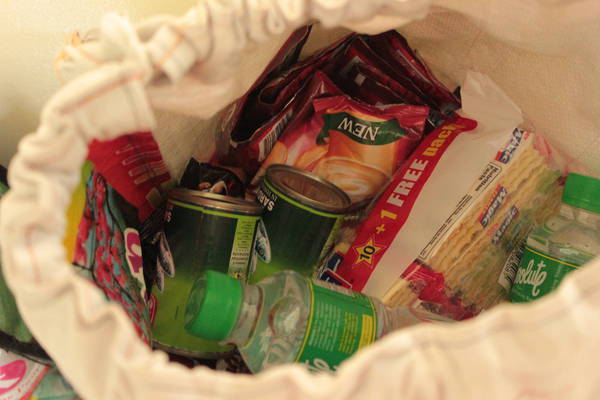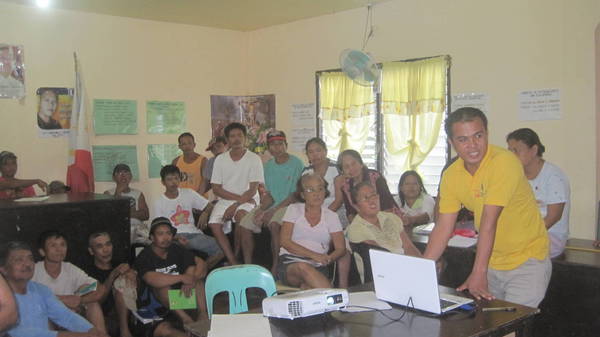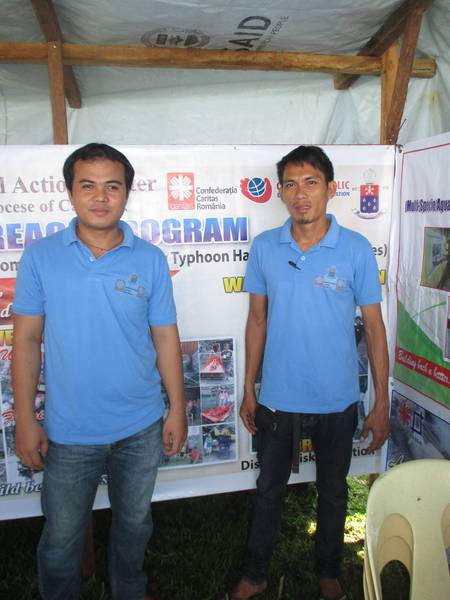Joper Conarco has worked with the Social Action Center in Calbayog since 2006. “I started as a volunteer”, he says. He soon got the opportunity to receive a two-years hands-on training in sustainable agriculture. “I was delighted”, Joper said. “I wanted to learn more on how I could practically help the Samar people. People in Samar are either farmers or fishermen. The poverty rates are high in our province. There is not much else”.
After finishing his two-years training, Joper became the DSAC’s Agriculture Coordinator. He was responsible for overseeing the DSAC’s projects in aquaculture, agro-forestry and farming. He enjoyed his work greatly and worked with farming communities and government stakeholders all over Samar Province.
When they typhoon hit the Philippines, Joper was outside of the affected area. “It was very difficult to get news on the situation in Basey and Marabut. All communication channels were cut. We were depended on stories from those who were able to receive some news via international news channels”.
Joper was quickly assigned to help coordinate the relief response. The DSAC in Calbayog tried to organize logistics, package relief goods and transport them to the affected areas. “We were lucky to have a network of volunteers working at the parish levels. We distributed the items to the parishes; and the parishes then repackaged and made sure the items received the people in need”.
“It was not always an easy job”, says Joper. There were so many people in need of support. We had to ensure our distribution was good and proper while being under extreme time pressure”.
 A summary of DSAC of Calbayog relief support provided in partnership with Caritas Internationalis (December 2013 – March 2014)
A summary of DSAC of Calbayog relief support provided in partnership with Caritas Internationalis (December 2013 – March 2014)
- 1,100 households were reached with immediate food relief through direct delivery of food packs. The packs were provided to 808 households in Basey and 292 households in Marabut.
- NFI and hygiene kits were distributed to 4,000 households.
- Unconditional Cash grants were provided to 2,500 households in order to revive local economies, augment and diversify dietary requirements, and provide means to support livelihoods for families
- Livelihoods support aimed at restoring access to food sources destroyed by the typhoon were initiated, including the provision of fishing gears to 34 coastal households Small-scale agricultural input kits (seeds, seedlings and farming tools) were provided to 3,146 households. Finally, small livestock (poultry) was provided to 70 households in inland communities
The emergency relief phase started to round up in April 2014. The DSAC had to make the transition to recovery activities. For the DSAC this meant connecting the recovery efforts to the wider development of Samar Province. The slogan of the Social Action Center is therefore “Building Samar Back Better”.
Joper was asked to be the project manager of project CROPS – Community Recovery of Principal agriculture Systems - in July. The project was a partnership with Caritas Czech Republic. It focuses on helping families recover and improve their farming options through distribution of lost farming tools and machines, but also by providing the farmers with weekly organic farming techniques.
 “Organic Farming is very important in these times”, according to Joper. “We work with rice farmers. Their conventional farming methods contribute to climate change, through the heavy reliance on chemicals and external inputs. Since climate change and hazards are one of dangers affected the communities, we induce the farmers to look at traditional seed varieties, use less chemicals, and less strain on natural resources (such as water). We do so through hands-on organic trainings, experimenting with local seed varieties, learning about different planting methods and pests/diseases. The farmers are very happy. They had never heard of these techniques before!”
“Organic Farming is very important in these times”, according to Joper. “We work with rice farmers. Their conventional farming methods contribute to climate change, through the heavy reliance on chemicals and external inputs. Since climate change and hazards are one of dangers affected the communities, we induce the farmers to look at traditional seed varieties, use less chemicals, and less strain on natural resources (such as water). We do so through hands-on organic trainings, experimenting with local seed varieties, learning about different planting methods and pests/diseases. The farmers are very happy. They had never heard of these techniques before!”
“Another important part of the activities is to support the farmers as farmers associations. Only when they are organized they can rely on support from other (governmental) stakeholders. The farmers are usually unaware of their rights and the different support channels.”
According to Joper, in some ways, the Typhoon has also had positive external effects for the Samar communities. “Before Haiyan, there were was little to no support to the communities in Samar. Right now, the international community is committed to help. That is a big step forward for us”. Joper says he learns from his partnership with Caritas Czech Republic. “It helps me plan my work and make longer term strategies.”
 The CROPS project is planned to end in December 2014. The DSAC and Caritas Czech Republic are now planning how to continue its support to the farmers associations for another year. We are working with farmers and women groups in Basey municipality and Marabut municipality. One of the plans is to introduce the System of Rice Intensification. We will teach the farmers how to plant rice using less seeds, less chemicals, while simultaneously boosting their production”.
The CROPS project is planned to end in December 2014. The DSAC and Caritas Czech Republic are now planning how to continue its support to the farmers associations for another year. We are working with farmers and women groups in Basey municipality and Marabut municipality. One of the plans is to introduce the System of Rice Intensification. We will teach the farmers how to plant rice using less seeds, less chemicals, while simultaneously boosting their production”.
Next to Caritas Czech Republic, the DSAC also works with Caritas Germany and Caritas Philippines (NASSA)/Caritas Internationalis. The projects focus on house construction/repair, Disaster Risk Reduction and restoration of marine resources. Hereby, the DSAC tries to have one common strategy for helping affected communities build Samar back better. “With a bias toward the poor”, according to DSAC Director Father Cesar.







